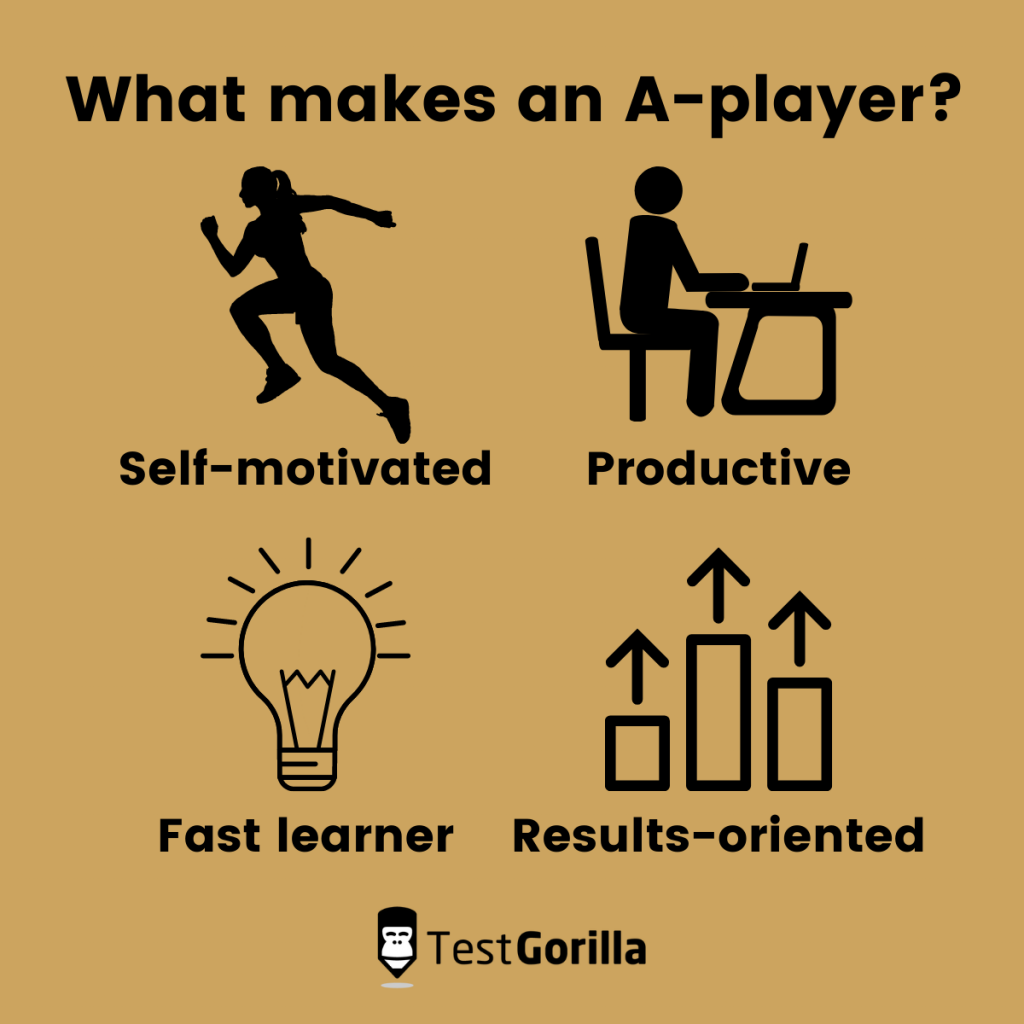Table of contents
Most hiring managers and team leaders have been around the block enough to know that attempting to turn the average team into a team of A-players is like trying to turn Cinderella’s pumpkin back into a coach after the clock strikes midnight. While not impossible, the process of trying to instill A-player skills and initiative will likely take more time and effort to achieve than if you started with a team full of A-players to begin with.
Streamlining the recruiting process to single out the A-players may seem like a daunting task, but with the proper system and tools in place, the payoff is well worth the effort. Time is money, and both must be taken seriously. Why settle for one or two A-players when you can have a whole team full of them?
Establish your A-player profile
The first step in hiring A-players is establishing your A-player profile. You wouldn’t be able to identify a candidate who has A-player material written all over them if you weren’t sure what skills would be necessary to be considered an A-player to begin with.
It’s easy to be lured in by someone’s laundry list of credentials; especially if it includes Ivy League education or work experience in high-performing or well-known companies. The environment in your company is unique to you, which means you have to start from the inside to determine the profile required for success.
Take a look at the A-players already employed: what characteristics, skills, and initiatives do they exemplify that are of benefit to the company? How do they make things work effortlessly? Conversely, observe the employees who aren’t quite reaching their potential. What skills, characteristics, and initiatives do you wish they would demonstrate to take the team to the next level? Once you’ve made all determinations concerning your profile, document it appropriately.
Developing your A-player profile will enable you to hone in on exactly the type of candidate your team needs. This may even lead you to hire candidates outside of the industry. While seemingly counterintuitive, it could be in your best self-interest to hire an A-player with both talent and drive that can be trained, rather than hiring someone with years of industry experience but none of the skills indicative of an A-player. Once you’ve identified your profile, hand over most (if not all) of the responsibilities you’ve been holding onto to your highest performing A-players so that you are free to continue recruiting a team full of them.
Assess candidates’ skills
After you’ve established the exact specifications of the profile of an A-player, you need to be able to weed out the candidates whose talent and skills don’t match up to your expectations without sacrificing your time. While interviewing is integral to cultivating a team full of A-players, rarely does an interviewer have a strong command of a candidate’s abilities after just one meeting.
You can easily assess candidates’ critical thinking skills before they even walk into an interview. Providing access to a critical thinking test can be a powerful way to maintain recruiting continuity while also ensuring that you’re attracting the A-players you really want.
You could focus on training your current employees to become A-players as well as look externally to fill gaps and increase your productivity. The critical thinking assessment is a simple way of weeding out the candidates who don’t have A-player potential; saving a significant amount of your time and effort that is better used toward retraining and recruiting your team.
Develop a strong recruiting reputation
It’s simple math: the more qualified people you interview, the more likely you’ll find the most qualified candidate for the position. It’s much easier to have ideal candidates find you, rather than hunting for them.
The easiest way to ensure there is a steady stream of A-players lining up for interviews is to maintain a rolling interview process. Continual recruiting provides multitudes of opportunities to communicate the message that your company is consistently seeking candidates who bring something to the table and perpetuates an A-player mindset both internally and externally.
Continual recruitment demonstrates to your current employees that maintaining standards is paramount, all the while communicating to external candidates that the bar is already set high for performance within the company. This creates a conducive environment for A-players in a way few other methods can.
The candidate being interviewed wants to feel as though the hiring manager is invested in learning about their skills and experience. Establishing a robust interview process perpetuates the idea that you’re invested and interested in hiring good people.
To determine who is, in fact, good, there must be open and honest dialogue founded on genuine interest. People want to work where they are seen, heard, and valued. So if you’re looking to hire A-players, deliver exceptional opportunities for your prospective employees as well.
Build your “farm team”
There is no escaping that recruiting is your biggest investment when it comes to hiring A-players, but that doesn’t mean that you have to start from scratch in a pool of unknown candidates. This is where the rolling recruitment and an honest connection with people come into play.
Chances are, your dream A-player team is out there somewhere working for someone else. Perhaps they are satisfied with their current employment, but they would like more growth opportunities. Maybe they’re in an entry-level position but know they could – and will – do more in another company when the time is right. Maybe they enjoyed the job at the beginning of their career but they are well on their way to outgrowing it, or worse, becoming bored and miserable in a position that no longer suits them.
When you have a reputation for consistent recruiting, open dialogue, and genuine interest in your candidates, you’ll most likely be the first to know when a strong A-player could be an enormous asset to your team.
It’s imperative to have a full farm team in reserve to ensure that your team is always full of the A-players necessary to keep your company running as it should. If a candidate comes looking for a position that you don’t have available at the moment, be honest about your needs and your interest in their involvement as soon as a position opens with their qualifications.
One of the benefits of continually interviewing is the opportunity to put your money where your mouth is: it proves that you are less interested in filling a position than you are in building a team full of A-players. People will understand that you aren’t stringing them along, but rather, will feel honored that you singled them out far before you had an opening for them. Staying in touch is a powerful tool in the plight of establishing a team of A-players.
Having just one A-player on a team can make a world of difference. They have the power to shape the whole climate and culture, shift mindsets, raise standards and powerfully impact the success of those around them. They alleviate stress and responsibility from hiring managers and team leaders, empowering them to step into their roles more fully. With the development of an A-player profile, proper assessments to streamline appropriate candidates, a rolling recruitment process, and a well-stocked farm team, you’ll never settle for just one A-player ever again.
Related posts
Hire the best candidates with TestGorilla
Create pre-employment assessments in minutes to screen candidates, save time, and hire the best talent.
Latest posts
The best advice in pre-employment testing, in your inbox.
No spam. Unsubscribe at any time.

Hire the best. No bias. No stress.
Our screening tests identify the best candidates and make your hiring decisions faster, easier, and bias-free.
Free resources
This checklist covers key features you should look for when choosing a skills testing platform
This resource will help you develop an onboarding checklist for new hires.
How to assess your candidates' attention to detail.
Learn how to get human resources certified through HRCI or SHRM.
Learn how you can improve the level of talent at your company.
Learn how CapitalT reduced hiring bias with online skills assessments.
Learn how to make the resume process more efficient and more effective.
Improve your hiring strategy with these 7 critical recruitment metrics.
Learn how Sukhi decreased time spent reviewing resumes by 83%!
Hire more efficiently with these hacks that 99% of recruiters aren't using.
Make a business case for diversity and inclusion initiatives with this data.




















